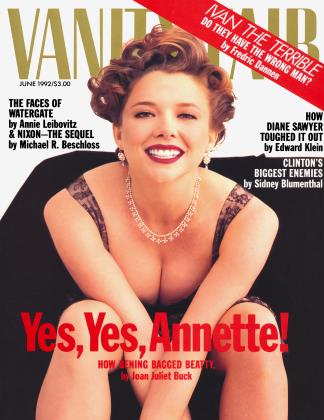Sign In to Your Account
Subscribers have complete access to the archive.
Sign In Not a Subscriber?Join NowEditor's Letter
Final Comeback?
nnie Leibovitz was on the South Lawn of the White House with her camera when the thirty-seventh president ducked into the helicopter that whisked him away for his last ride on Air Force One and the first taste of his new life in exile. On the twentieth anniversary of the "third-rate burglary" that brought him down, Leibovitz summons up the ghosts of Watergate in a haunting portfolio.
The irony is that, while all the president's men have vanished into the margins, Richard Milhous Nixon has not. The former president contends that history is only "ripe" after fifty years, but as Michael R. Beschloss relates on page 114, he has done an extraordinary job of reshaping his own image in less than half that time. Beschloss, historian and author most recently of The Crisis Years: Kennedy and Khrushchev, 1960-1963, talked with Nixon at his mock-Tudor New Jersey town house weeks before the striking moment he reoriented American foreign policy toward Russia. On March 10, 1992, Nixon leaked a memo that needled President Bush for failing to sustain Boris Yeltsin's struggling democracy. Nixon's break with Bush was heralded on the front page of The New York Times and led three network newscasts. Instead of reacting angrily, Bush quickly announced he completely agreed with Nixon and soon after unveiled a new foreign-aid package. That same week, Bush became the first president to speak on the same podium as Nixon since his fall from grace, at a dinner for the Nixon Library. There is an eerie symmetry to the rise, fall, and rise of Nixon: his power was unraveled by the press and he has used the press to engineer his "final comeback."
Annie Leibovitz's portfolio was produced by Vanity Fair's Washington editor, Susan Mercandetti, who persuaded all to face the camera again—except John and Maureen Dean, who resolutely refuse to share ink with G. Gordon Liddy. (John Dean is currently suing Liddy over his allegations that Dean was the mastermind behind Watergate.)
Looking at the pictures of the repenters, only one thing is missing: the sound track of Nixon's voice on the Oval Office tapes—cynical, paranoid, vindictive, and profane—the voice that chilled a generation.
Editor in chief
 View Full Issue
View Full Issue












Subscribers have complete access to the archive.
Sign In Not a Subscriber?Join Now